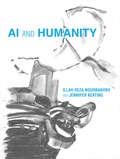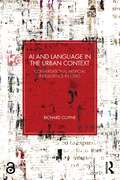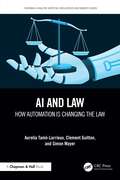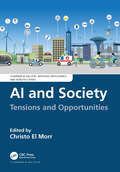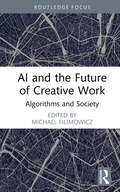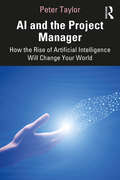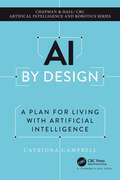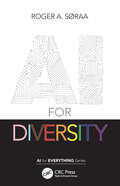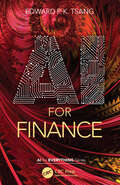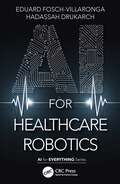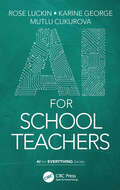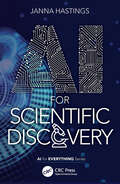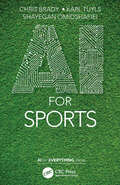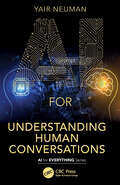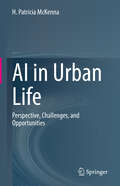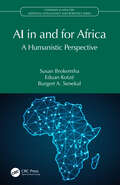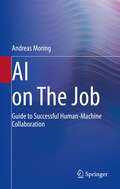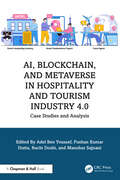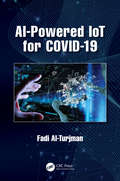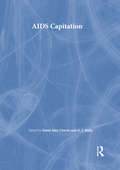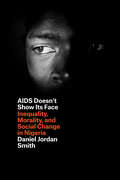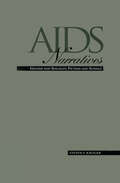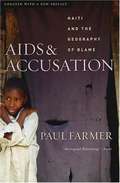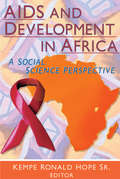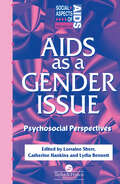- Table View
- List View
AI and Humanity (The\mit Press Ser.)
by Illah Reza Nourbakhsh Jennifer KeatingAn examination of the implications for society of rapidly advancing artificial intelligence systems, combining a humanities perspective with technical analysis; includes exercises and discussion questions.AI and Humanity provides an analytical framing and a common language for understanding the effects of technological advances in artificial intelligence on society. Coauthored by a computer scientist and a scholar of literature and cultural studies, it is unique in combining a humanities perspective with technical analysis, using the tools of literary explication to examine the societal impact of AI systems. It explores the historical development of these technologies, moving from the apparently benign Roomba to the considerably more sinister semi-autonomous weapon system Harpy. The book is driven by an exploration of the cultural and etymological roots of a series of keywords relevant to both AI and society. Works examined range from Narrative of the Life of Frederick Douglass, given a close reading for its themes of literacy and agency, to Simon Head's critique of the effects of surveillance and automation on the Amazon labor force in Mindless.Originally developed as a textbook for an interdisciplinary humanities-science course at Carnegie Mellon, AI & Humanity offers discussion questions, exercises (including journal writing and concept mapping), and reading lists. A companion website provides updated resources and a portal to a video archive of interviews with AI scientists, sociologists, literary theorists, and others.
AI and Language in the Urban Context: Conversational Artificial Intelligence in Cities
by Richard CoyneIn a world influenced increasingly by artificial intelligence (AI), the city emerges as a dynamic hub of digital conversations. AI and Language in the Urban Context offers a novel exploration of how AI, particularly large language models (LLMs), is transforming urban environments. Moving beyond the typical technological narratives, this book draws on the author’s unique expertise in design, semiotics and hermeneutics to present a critical cultural perspective on AI’s role in the city.Focusing on the intersection of urban theory and AI, the book reveals how conversational AI is reshaping social interactions, decision-making processes, and media in urban spaces. By merging practical knowledge of AI algorithms with an understanding of urban practices, the author highlights the opportunities and challenges AI presents for modern cities.This book is essential for anyone interested in the future of urban living. It provides a deep dive into the technical, social and cultural implications of AI in cities, offering practical examples and philosophical insights. Readers will gain a comprehensive understanding of how AI is influencing the design, governance and dynamics of urban life in the digital age.The Open Access version of this book, available at www.taylorfrancis.com, has been made available under a Creative Commons [Attribution-Non Commercial-No Derivatives (CC-BY-NC-ND) 4.0 license.
AI and Law: How Automation is Changing the Law (Chapman & Hall/CRC Artificial Intelligence and Robotics Series)
by Aurelia Tamo-Larrieux Clement Guitton Simon MayerThis book provides insights into how AI is changing legal practice, government processes, and individuals’ access to those processes, encouraging each of us to consider how technological advances are changing the legal system. Particularly, and distinct from current debates on how to regulate AI, this books focuses on how the progressive merger between computational methods and legal rules changes the very structure and application of the law itself.We investigate how automation is changing the legal analysis, legal rulemaking, legal rule extraction, and application of legal rules and how this impacts individuals, policymakers, civil servants, and society at large. We show through many examples that a debate on how automation is changing the law is needed, which must revolve around the democratic legitimacy of the automation of legal processes, and be informed by the technical feasibility and tradeoffs of specific endeavors.
AI and Society: Tensions and Opportunities (Chapman & Hall/CRC Artificial Intelligence and Robotics Series)
by Christo El MorrAI's impact on human societies is and will be drastic in so many ways. AI is being adopted and implemented around the world, and government and universities are investing in AI studies, research, and development. However, very little research exists about the impact of AI on our lives. This book will address this gap; it will gather reflections from around the world to assess the impact of AI on different aspects of society as well as propose ways in which we can address this impact and the research agendas needed.
AI and the Future of Creative Work: Algorithms and Society (Algorithms and Society)
by Michael FilimowiczThis book focuses on the intelligent technologies that are transforming creative practices and industries. The future of creative work will be more complicated than “the robots will take our jobs.” The workplace is becoming increasingly hybridized, with human and computational labor complementing each other. Some economic roles for the former will no doubt fade over time, while new roles are created to produce artificial intelligence (AI)-related technologies and implementations for productivity. New tools for the generation and personalization of content across platforms will be as ubiquitous as the automation of repetitive tasks in content creation workflows. Cultural conceptions of what it means to be a creative worker will necessarily change as a result of these transformations in human-machine labor. The volume covers the possibilities of humans and robots developing collegial relationships, creative cybernetics as machines and artists become co-creators of art, the reconcentration of corporate power as AI transforms the music industry, the rhetoric of algorithm-driven cultural production in streaming media, and how artisans provide a model of counter-hegemony to automation processes. Scholars and students from many backgrounds, as well as policy makers, journalists and the general reading public will find a multidisciplinary approach to questions posed by creative labor and industry research from communication, philosophy, robotics, media, music and the creative arts, informatics, information science, and computer science and engineering.
AI and the Project Manager: How the Rise of Artificial Intelligence Will Change Your World
by Peter TaylorEnabling project managers to adapt to the new technology of artificial intelligence, this first comprehensive book on the topic discusses how AI will reinvent the project world and allow project managers to focus on people. Studies show that by 2030, 80 percent of project management tasks, such as data collection, reporting, and predictive analysis, will be carried out by AI in a consistent and efficient manner. This book sets out to explore what this will mean for project managers around the world and equips them to embrace this technological advantage for greater project success. Filled with insights and examples from tech providers and project experts, this book is an invaluable resource for PMO leaders, change executives, project managers, programme managers, and portfolio managers. Anyone who is part of the global community of change and project leadership needs to accept and understand the fast- approaching AI technology, and this book shows how to use it to their advantage.
AI by Design: A Plan for Living with Artificial Intelligence (Chapman & Hall/CRC Artificial Intelligence and Robotics Series)
by Catriona CampbellThis book introduces the reader to Artificial Intelligence and its importance to our future. Campbell uses behavioural psychology, explores technology, economics, real-life and historical examples to predict five future scenarios with AI. Illustrating through speculative fiction, she describes possible futures after AI exceeds human capabilities. We are at a tipping point in history and must plan to ensure a successful co-existence with artificial intelligence. This book explains how to design for a future with AI so that, rather than herald our downfall, it helps us achieve a new renaissance.
AI for Diversity (AI for Everything)
by Roger A. SøraaArtificial intelligence (AI) is increasingly impacting many aspects of people’s lives across the globe, from relatively mundane technology to more advanced digital systems that can make their own decisions. While AI has great potential, it also holds great peril depending on how it is designed and used. AI for Diversity questions how AI technology can lead to inclusion or exclusion for diverse groups in society. The way data is selected, trained, used, and embedded into societies can have unfortunate consequences unless we critically investigate the dangers of systems left unchecked, and can lead to misogynistic, homophobic, racist, ageist, transphobic, or ableist outcomes. This book encourages the reader to take a step back to see how AI is impacting diverse groups of people and how diversity-awareness strategies can impact AI.
AI for Finance (AI for Everything)
by Edward P. TsangFinance students and practitioners may ask: can machines learn everything? Could AI help me? Computing students or practitioners may ask: which of my skills could contribute to finance? Where in finance should I pay attention? This book aims to answer these questions. No prior knowledge is expected in AI or finance. To finance students and practitioners, this book will explain the promise of AI, as well as its limitations. It will cover knowledge representation, modelling, simulation and machine learning, explaining the principles of how they work. To computing students and practitioners, this book will introduce the financial applications in which AI has made an impact. This includes algorithmic trading, forecasting, risk analysis portfolio optimization and other less well-known areas in finance. This book trades depth for readability. It aims to help readers to decide whether to invest more time into the subject. This book contains original research. For example, it explains the impact of ignoring computation in classical economics. It explains the relationship between computing and finance and points out potential misunderstandings between economists and computer scientists. The book also introduces Directional Change and explains how this can be used.
AI for Healthcare Robotics (AI for Everything)
by Eduard Fosch-Villaronga Hadassah DrukarchWhat is artificial intelligence (AI)? What is healthcare robotics? How can AI and healthcare robotics assist in contemporary medicine? Robotics and AI can offer society unimaginable benefits, such as enabling wheelchair users to walk again, performing surgery in a highly automated and minimally invasive way, and delivering care more efficiently. AI for Healthcare Robotics explains what healthcare robots are and how AI empowers them in achieving the goals of contemporary medicine.
AI for School Teachers (AI for Everything)
by Rose Luckin Mutlu Cukurova Karine GeorgeWhat is artificial intelligence? Can I realistically use it in my school? What’s best done by human intelligence vs. artificial intelligence, and how do I bring these strengths together? What would it look like for me, and my school, to be AI Ready? AI for School Teachers will help teachers and headteachers understand enough about AI to build a strategy for how it can be used in their school. Examining the needs of schools to ensure they are ready to leverage the power of AI and drawing examples from early years to high school students, this book outlines the educational implications and benefits that AI brings to school education in practical ways. It develops an understanding of what AI is and isn't and how we define and measure what we value and provides a framework which supports a step-by-step approach to developing an AI mindset, focusing on ways to improve educational opportunities for students with evidence-informed interventions.
AI for Scientific Discovery (AI for Everything)
by Janna HastingsAI for Scientific Discovery provides an accessible introduction to the wide-ranging applications of artificial intelligence (AI) technologies in scientific research and discovery across the full breadth of scientific disciplines. AI technologies support discovery science in multiple ways. They support literature management and synthesis, allowing the wealth of what has already been discovered and reported on to be integrated and easily accessed. They play a central role in data analysis and interpretation in the context of what is called ‘data science’. AI is also helping to combat the reproducibility crisis in scientific research by underpinning the discovery process with AI-enabled standards and pipelines and supporting the management of large-scale data and knowledge resources so that they can be shared and integrated and serve as a background ‘knowledge ecosystem’ into which new discoveries can be embedded. However, there are limitations to what AI can achieve and its outputs can be biased and confounded and thus should not be blindly trusted. The latest generation of hybrid and ‘human-in-the-loop’ AI technologies have as their objective a balance between human inputs and insights and the power of number-crunching and statistical inference at a massive scale that AI technologies are best at.
AI for Sports (AI for Everything)
by Chris Brady Karl Tuyls Shayegan OmidshafieiIt seems that artificial intelligence (AI) is always just five years away, but it never arrives. Recently, however, developments have made the practical utility of game theory a genuine reality. Will sport provide the petri dish in which AI will prove itself? What do domain specialists like managers and coaches want to know that they can’t currently find out, and can AI provide the answer? What competitive advantages might AI provide for recruitment, performance and tactics, health and fitness, pedagogy, broadcasting, eSports, gambling and stadium design in the future? Written by leading experts in both sports management and AI, AI for Sports begins to answer these and many other questions on the future of AI for sports.
AI for Understanding Human Conversations (AI for Everything)
by Yair NeumanArtificial intelligence (AI) and specifically large language models (LLMs) revolutionize our lives with new technologies appearing at an unprecedented rate. These technologies can potentially change how we understand human conversations, from the dialogues of married couples to diplomatic conversations.This book explains how to use LLMs to analyze human conversations and how better LLMs can be developed by incorporating a deep theoretical understanding.Drawing on case studies from Pulp Fiction to diplomatic meetings, the book provides detailed, approachable, and theoretically grounded explanations of how LLMs can help us understand conversations.
AI in Urban Life: Perspective, Challenges, and Opportunities
by H. Patricia McKennaIn exploring artificial intelligence (AI) in urban life, this book brings together and extends thinking on how human-AI interactions are continuously evolving. Through such interactions, people are aided on the one hand, while becoming more aware of their own capabilities and potentials on the other hand, pertaining, for example, to creativity, human sensing, and collaboration. It is the particular focus of research questions developed in relation to awareness, smart cities, autonomy, privacy, transparency, theory, methods, practices, and collective intelligence, along with the wide range of perspectives and opportunities offered, that set this work apart from others. Conceptual frameworks are formulated for each of these areas to guide explorations and understandings in this work and going forward. A synthesis is provided in the final chapter for perspectives, challenges and opportunities, and conceptual frameworks for urban life in an era of AI, opening the way for evolving research and practice directions.
AI in and for Africa: A Humanistic Perspective (Chapman & Hall/CRC Artificial Intelligence and Robotics Series)
by Susan Brokensha Eduan Kotzé Burgert A. SenekalAI in and for Africa: A Humanistic Perspective explores the convoluted intersection of artificial intelligence (AI) with Africa’s unique socio-economic realities. This book is the first of its kind to provide a comprehensive overview of how AI is currently being deployed on the African continent. Given the existence of significant disparities in Africa related to gender, race, labour, and power, the book argues that the continent requires different AI solutions to its problems, ones that are not founded on technological determinism or exclusively on the adoption of Eurocentric or Western-centric worldviews. It embraces a decolonial approach to exploring and addressing issues such as AI’s diversity crisis, the absence of ethical policies around AI that are tailor-made for Africa, the ever-widening digital divide, and the ongoing practice of dismissing African knowledge systems in the contexts of AI research and education. Although the book suggests a number of humanistic strategies with the goal of ensuring that Africa does not appropriate AI in a manner that is skewed in favour of a privileged few, it does not support the notion that the continent should simply opt for a "one-size-fits-all" solution either. Rather, in light of Africa’s rich diversity, the book embraces the need for plurality within different regions’ AI ecosystems. The book advocates that Africa-inclusive AI policies incorporate a relational ethics of care which explicitly addresses how Africa’s unique landscape is entwined in an AI ecosystem. The book also works to provide actionable AI tenets that can be incorporated into policy documents that suit Africa’s needs. This book will be of great interest to researchers, students, and readers who wish to critically appraise the different facets of AI in the context of Africa, across many areas that run the gamut from education, gender studies, and linguistics to agriculture, data science, and economics. This book is of special appeal to scholars in disciplines including anthropology, computer science, philosophy, and sociology, to name a few.
AI on The Job: Guide to Successful Human-Machine Collaboration
by Andreas MoringThis book is a practical guide to using artificial intelligence with motivated employees in companies and organizations. You will learn what the prerequisites are for people to look forward to productive collaboration with "intelligent machines". Because this is the only way to leverage the full potential of AI. To this end, you will receive an overview of how and where AI can be used in companies and how to identify the right areas of application for AI in your company. The main issue here is the following: which tasks will be taken over by AI in the future and which should continue to be performed by employees. These decisions change processes and tasks and require practical change management and motivation. In this book, you will learn how to motivate and inspire people for these new tasks, so that the steps towards using AI in the work environment can succeed in the best possible way. About the Author: Prof. Dr. Andreas Moring is Professor of Digital Business, Innovation & AI at the International School of Management. He is founder and director of the JuS.TECH Institute for AI and Sustainability, co-founder of the WeGoFive initiative for productive human-AI cooperation and topic sponsor for human-AI cooperation at the Artificial Intelligence Center ARIC in Hamburg. This book is a translation of the original German 1st edition KI im Job by Andreas Moring, published by Springer-Verlag GmbH Germany, part of Springer Nature in 2021. The translation was done with the help of artificial intelligence (machine translation by the service DeepL.com). A subsequent human revision was done primarily in terms of content, so that the book will read stylistically differently from a conventional translation. Springer Nature works continuously to further the development of tools for the production of books and on the related technologies to support the authors.
AI, Blockchain, and Metaverse in Hospitality and Tourism Industry 4.0: Case Studies and Analysis
by Pushan Kumar Dutta Adel Ben Youssef Ruchi Doshi Manohar SajnaniThe book offers a critical exploration of the integration of AI, blockchain, and metaverse technology in the hospitality and tourism industry to investigate the potential of these technologies in revolutionizing the industry. This comprehensive work studies, with practical examples, how cutting-edge technologies of Industry 4.0 are transforming luxury industry into a high-touch, hyper-personalized metaverse. It explains how these technologies can be used to improve customer experience and operational efficiency in areas such as guest interaction, supply chain management, payment processing, and virtual stores. The book also discusses the conditions that can promote sustainable development in the hospitality industry using Industry 4.0 technologies. Provides an innovative perspective by blending high-tech trends like AI, blockchain, and metaverse with traditional wellness practices Emphasis on ethical considerations and potential risks associated with the use of these technologies, providing a balanced perspective on their impact Includes case studies and practical examples on how businesses can use AI, blockchain, and the metaverse to improve customer experiences and operational efficiency Explores how the hospitality industry can embrace Industry 4.0 technologies to improve its operations, enhance customer experiences, and contribute to sustainable development Provides a roadmap for companies looking to implement these technologies, highlighting potential benefits and pitfalls of each approach This reference book is for scholars and professionals in computer science who are interested in studying the effect of AI, blockchain, and metaverse in hospitality and tourism industry.
AI-Powered IoT for COVID-19
by Fadi Al-TurjmanThe Internet of Things (IoT) has made revolutionary advances in the utility grid as we know it. Among these advances, intelligent medical services are gaining much interest. The use of Artificial Intelligence (AI) is increasing day after day in fighting one of the most significant viruses, COVID-19. The purpose of this book is to present the detailed recent exploration of AI and IoT in the COVID-19 pandemic and similar applications. The integrated AI and IoT paradigm is widely used in most medical applications, as well as in sectors that deal with transacting data every day. This book can be used by computer science undergraduate and postgraduate students; researchers and practitioners; and city administrators, policy makers, and government regulators. It presents a smart and up-to-date model for COVID-19 and similar applications. Novel architectural and medical use cases in the smart city project are the core aspects of this book. The wide variety of topics it presents offers readers multiple perspectives on a variety of disciplines. Prof. Dr. Fadi Al-Turjman received his PhD in computer science from Queen’s University, Kingston, Ontario, Canada, in 2011. He is a full professor and research center director at Near East University, Nicosia, Cyprus.
AIDS Capitation
by David A CherinDiscover effective strategies for AIDS healthcare!You’ll definitely want to see what’s documented inside AIDS Capitation if you’re affiliated in any way with current efforts to bolster and improve healthcare policies and procedures for AIDS victims and their families. With this scholarly, up-to-date guidebook, you’ll find that your awareness and knowledge base concerning contemporary AIDS healthcare issues will expand and diversify, giving you a more stable information base from which you can make your own policy changes and civic organization improvements.If you’re a practitioner in HIV/AIDS care, an academic in HIV/AIDS research, or one of the many public officials currently involved in healthcare reform, you’ll find the guidance and proven strategies you need in AIDS Capitation. AIDS Capitation gives you a broad range of information including: descriptive and evaluative aspects of the model of care directions for implementing an innovative model of terminal home care modalities of care in end-stage treatment measurement issues in evaluative research help in measuring outcomes in community-based care funding opportunitiesWithout a doubt, the onset of HIV/AIDS has changed the way we view life. Our schools, government offices, and healthcare venues must change also. AIDS Capitation has everything you need to begin that process of change in your community.
AIDS Doesn't Show Its Face: Inequality, Morality, and Social Change in Nigeria
by Daniel Jordan SmithAIDS and Africa are indelibly linked in popular consciousness, but despite widespread awareness of the epidemic, much of the story remains hidden beneath a superficial focus on condoms, sex workers, and antiretrovirals. Africa gets lost in this equation, Daniel Jordan Smith argues, transformed into a mere vehicle to explain AIDS, and in AIDS Doesn’t Show Its Face, he offers a powerful reversal, using AIDS as a lens through which to view Africa. Drawing on twenty years of fieldwork in Nigeria, Smith tells a story of dramatic social changes, ones implicated in the same inequalities that also factor into local perceptions about AIDS—inequalities of gender, generation, and social class. Nigerians, he shows, view both social inequality and the presence of AIDS in moral terms, as kinds of ethical failure. Mixing ethnographies that describe everyday life with pointed analyses of public health interventions, he demonstrates just how powerful these paired anxieties—medical and social—are, and how the world might better alleviate them through a more sensitive understanding of their relationship.
AIDS Narratives: Gender and Sexuality, Fiction and Science (Gender and Genre in Literature #7)
by Steven F. KrugerFirst published in 1996. Routledge is an imprint of Taylor & Francis, an informa company.
AIDS and Accusation: Haiti and the Geography of Blame
by Paul FarmerExposes the racism inherent in the now-discredited supposition that AIDS came to the US via Haiti. (It was the other way around.) Award-winning author Paul Farmer, now working in Rwanda, updates this 1992 study with a new preface.
AIDS and Development in Africa: A Social Science Perspective (Haworth Psychosocial Issues Of Hiv/aids Ser.)
by R Dennis Shelby Kempe Ronald Hope, SrAIDS and Development in Africa: A Social Science Perspective is the first book-length treatment of both the impact of AIDS in Africa and an assessment of intervention strategies in varying cultural situations. Developed from revised selected papers from the nineteenth Southern African Universities Social Science Conference, AIDS and Development in Africa will be of interest to counselors, medical and development practitioners, Africanists, and AIDS researchers. From this book, you will find wide analytical coverage of the issues and country case studies related to the contributory factors and development impact of the HIV/AIDS pandemic in Africa. You will also explore the ability of countries to willingly promote and cope with the pandemic in the context of their different economic circumstances.Specifically in AIDS and Development in Africa, you will read about: socioeconomic context of AIDS social scientific explanations of the AIDS pandemic in Africa HIV/AIDS and the status of women in Botswana and Swaziland sexual abuse and HIV/AIDS law and HIV/AIDS orphans of the AIDS pandemic media and the African context of social construction human resource development and training in relation to HIV/AIDS in ZambiaAIDS and Development in Africa uses a multidisciplinary social science perspective in case studies of such countries as Botswana, Swaziland, Zimbabwe, South Africa, Malawi, and Zambia to reveal contributory factors and the developmental impact of HIV/AIDS in Africa. This book demonstrates the human consequences of AIDS and the efforts being made by governments, individuals, families, villages, communities, and national government organizations to respond to the pandemic. For example, you will learn about information campaigns and peer education approaches that are successfully increasing transmission awareness and condom use. You will read beyond the usual analysis of demographics and receive much more substantial assessments and analyses of the burden on people, economies, and health care systems of the African countries. AIDS and Development in Africa is indispensable to anyone who is involved with HIV/AIDS prevention/intervention in Africa. This comprehensive book provides you with essential and up-to-date research on the many issues surrounding Africa’s HIV/AIDS pandemic.
AIDS as a Gender Issue: Psychosocial Perspectives (Social Aspects of AIDS)
by Lydia Bennett Catherine Hankins Lorraine SherrThis international collection examines a wide range of psycho-social aspects of AIDS and HIV infection, including prevention, education, healthcare and policy in terms of gender challenges.
